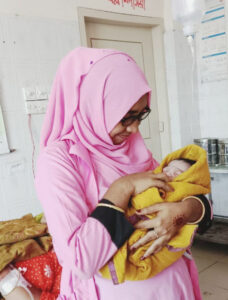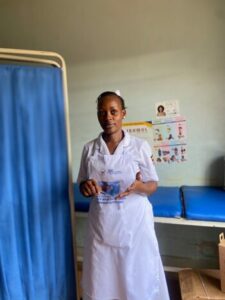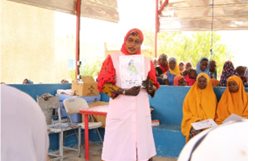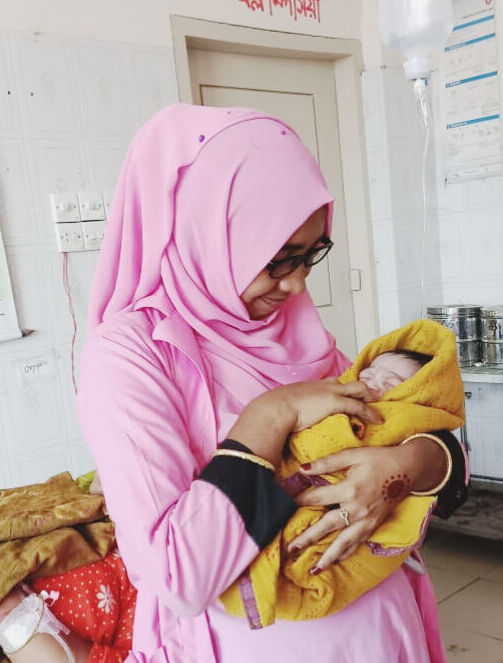Photo Caption: This is a picture of Midwife Bilkis Aktern working in Noakhali District, Bangladesh. Photo credit Taimur Vai. Noor-E-Alam Taimur.
Every year, Save the Children celebrates International Day of the Midwife as an opportunity to highlight the incredible work that midwives are doing every day to help mothers and newborns survive and thrive. This day is also an opportunity to advocate for increased investment, resources, recognition, and representation for midwives around the world. This year, International Day of the Midwife 2024 focuses on midwives as a “vital climate solution.”
Climate change is among the top threats to sustainable development, affecting nutrition and health outcomes, educational attainment, and professional and financial livelihoods. The effects of climate change on health are disproportionately borne by vulnerable groups, and can exacerbate underlying inequities linked to gender, race, geography, and socioeconomic status. Climate-driven events, such as extreme heat, air pollution, drought, and flooding, directly affect both maternal and fetal health and development and can limit the accessibility and availability of critical health services for pregnant women and girls, mothers, and newborns. Midwives are essential health providers offering clinical care and support to pregnant women/adolescents, mothers, and newborns in their communities, making these services more sustainable and accessible for everyone. As the negative impacts of climate change increase, midwives are also uniquely positioned to support health systems to adapt and to support women and girls with care closer to home, potentially mitigating climate-related barriers to accessing essential health services.
Climate-related incidents are threatening the provision of essential services.
Save the Children supports midwives in several countries around the world, including Bangladesh, Niger, and Uganda, where the effects of climate change are impacting access to and the provision of essential maternal and newborn health services.

Bilkis Akter has been working as a midwife in Noakhali District, Bangladesh since 2018, with support from the Shongzog (Connect) Project since 2020, which aims to develop scalable approaches to increase use of postpartum family planning and antenatal and postnatal care among first-time mothers (ages 15 to 24). Midwife Bilkis explains the climate-related challenges of providing services in a remote area, “[This] is a natural disaster-prone area. Mothers can’t come to the health center during storms, extreme heat, and heavy rains or winters.” As a result, they struggle to access essential health care, especially antenatal and postnatal care.

In Uganda, Stella Nakabuye is a midwife with over ten years of experience. She works at a hospital in Mukono District as part of the Saving Women and Preterm Babies project (SWAP), which supports the delivery and institutionalization of evidence-based, lifesaving interventions for pregnant women with complications that can lead to premature birth, and for small and sick newborns. Even in an urban area like the Mukono District, climate–related incidents are impacting the work of midwives. Midwife Stella notes that, “Seasonal heavy rains can cause flooding due to the hospital’s location on a slope, impacting access to the facility and the overall health service delivery.”

Midwife Charifatou Djibo works in Guidan Roumdji health district of Niger with USAID Kulawa, which focuses on improving maternal and newborn health at facility and community levels by supporting the national strategy of mentoring health workers, including midwives, ultimately helping to reduce maternal and neonatal mortality. Niger is also experiencing an increasing number of climate– related incidents including drought, extreme heat, and flooding, which has been associated with recurring outbreaks of diseases like cholera. This extreme weather creates challenges for midwives providing care and for pregnant women and mothers seeking care for themselves and their newborns.
Despite these climate-related challenges, these midwives are committed to finding ways to provide services for pregnant women and girls, mothers, and newborns, while also furthering interventions and approaches that are more sustainable and which have a lower environmental impact.
Midwives provide continuity of care which helps to reduce the impact of climate-related incidents.
Providing continuity of care at home and in facilities from before pregnancy to after birth is a key way that midwives are improving maternal and newborn health outcomes, while also increasing the resilience of health systems in communities when climate-related incidents occur.
Midwife Bilkis notes that, in Bangladesh, when storms, extreme heat, or heavy rains prevent mothers from being able to travel to the health center, “We strive to ensure that no mother or child is deprived of our services.” If mothers are unable to come to the service center due to extreme weather, Midwife Bilkis advises them through phone calls if necessary, “I give my phone number to the mothers who come to me for services so that they can get the necessary advice from me in case of an emergency. It protects mothers and babies from many incidents. Our service center is open 24/7, and we always remain ready to ensure services to mothers and children during any natural calamity.”
In Niger, thanks to the help and support of midwives like Charifatou, mothers also feel empowered to seek care and guidance when needed and follow recommended practices at home. One mother recounts her positive experience after receiving guidance on practicing Kangaroo Mother Care at home from a midwife for her low birthweight son, Issoufa, “I am very happy…before, most of the children born small like Issoufa did not survive because their mothers were not initiated into this method, even though it is simple, less expensive, and effective to save our children.”
By integrating capacity strengthening initiatives, Save the Children is also committed to working together with local governments and existing health systems to ensure that more and more midwives are equipped with the skills and tools needed to offer continuity of critical midwifery services, closer to the mothers and newborns who need them. With mentorship and training programs, more midwives can provide timely and quality care, reducing the need for referrals and additional travel for mothers and their newborns, while also averting potential complications requiring additional care. Midwife Charifatou in Niger explains, “I was trained on the Helping Babies Survive/Helping Mothers Survive [packages] by the USAID Kulawa project, which has greatly improved my ability to offer quality services to women in our health area. I used to refer [to the district hospital] any woman who had a complication like postpartum hemorrhage, preeclampsia or a newborn with a low birth weight. We said to ourselves that ‘this is beyond our competencies.’ But today these referrals are rare. Since I was trained, I easily take care of cases of complications related to pregnancies or childbirth by implementing all the techniques learned during this training.”
With these capacity strengthening initiatives, more midwives will be able to offer continuity of care when and where pregnant women/adolescents, mothers, and newborns need them, including when climate-related incidents occur.
Midwives are key advocates and mentors for breastfeeding, which is better for newborns, mothers, and the environment.
In addition to continuity of care, midwives provide vital education, advocacy, and support for breastfeeding. Breastfeeding offers crucial health advantages to newborns and mothers while also being environmentally friendly. In Uganda, Midwife Stella notes that, “Education on breastfeeding extends beyond health benefits; it also encompasses environmental impacts. By choosing to breastfeed, mothers help reduce the use of resources like firewood and decrease waste from breast milk substitutes’ packaging. This contributes to less environmental degradation and supports our hospital’s initiative to promote practices that are not only healthful but also environmentally responsible.”
As a midwife, Stella’s support for breastfeeding begins during a woman’s pregnancy, where she educates expectant mothers on the importance of breastfeeding and steps to take for successful breastfeeding, such as proper nutrition and hydration. She also educates expectant mothers to dispel common misconceptions about the practice. This education and advocacy continues throughout labor and delivery and through the postpartum period. “During labor, our priority is to promote natural breastfeeding practices,” says Stella. “After delivery, the support continues vigorously…mothers are encouraged to breastfeed exclusively for six months. For working mothers, we discuss strategies for expressing and storing breast milk to maintain their breastfeeding routine.” With this counselling and support, midwives help mothers to breastfeed more successfully and for longer, ultimately reducing the need for the packaging, shipping, and water required for breastmilk alternatives, while also providing benefits to the health of mothers and newborns.
Midwives advocate for and empower women to seek the care they need.
Despite the challenges that midwives face, including those due to climate change, they remain committed to adapting and ensuring that mothers and newborns get the care they need, while also serving as advocates for women’s health. Midwife Stella from Uganda shares, “We stand committed as champions of women’s health and advocates for sustainable practices that uplift our community.” In Bangladesh, Midwife Bilkis shares, “…When I counsel a mother along with her family members, the mother feels more motivated and empowered. By doing this, they get help from family members to come for the next service. I alone have been providing delivery services for a long time. Although it is difficult for me to do this challenging work, marginalized people are benefiting, and people’s trust in government service centers is gradually increasing. This inspires me.”
Midwives will always play pivotal roles in their communities, offering critical support and care to mothers, newborns, and their families. As health systems adapt to new challenges brought on by climate change, and as communities aim to build resilience and lessen the associated negative impacts of climate change, the work of midwives will continue to be a vital part of climate solutions around the world.
